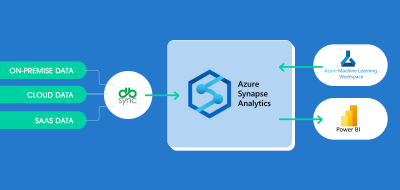We exist in a digital world today. Digitization is the new norm of the present which causes an explosion of the quantity of unstructured and structured data formed, shared and stored simultaneously. The generated data is contributed through not just digital media, transactions, and business domains but also via individuals. For example, people share 30 billion worth of content on Facebook and Twitter on a monthly basis. These massive collections of data are termed as “Big Data”. This high volume of data basically exceeds data-processing capacity and requires high data velocity discovery, capture and analysis technologies.
According to 2013 statistics, the digital universe has expanded vastly in the last two years. This ever-growing data stream amounted to 150 exabytes around 2005 and exceeded to 1200 exabytes in 2010.Cisco Data predicts data traffic across IP pathways, internet and mobile networks to increase by 1.8 times more in 2017 as compared to 2014. IBM is expecting it to increase by approximately 35000 exabytes by 2020.

Source: http://searchenginewatch.com/article/2334650/Making-Sense-of-Big-Data-in-Search-Marketing
Applications of Big Data and Search
Big Data is fed constantly by mobile, cloud, social networks and consumerization. Making use of this data volume requires proper selection, excluding trashy data and recovering quality data through search engines. Critical business analyses involve usage of quality search technologies and their application is found in various fields throughout the world.
a. Government: Big Data and Search help in cyber security issues, logistics, law investigations, physical sciences and intelligent analyses to avoid terrorism.
b. Retail businesses: Facebook, Twitter and blogs are useful in analyzing business trends, product performance, preferences and market segmentation.
c. Other major industries include health, auto, Airlines, Financial institutions and energy sectors.
Big Data currently holds such complex and large database that it is very difficult to manage or analyze it through traditional data processing methods or typical database management tools. Thus, information seeking businesses use data frameworks such as ClouderaCDH 5 to explore multi-structured computed data. These are readily available, secure and effectively integrated with software and hardware.
Search engines are an efficient tool to change, index, re-index and test big data sets. Advanced search technologies like Apache Solr, Elastic Cloud, Amazon Cloud services, Lucene and Solr Cloud help in increasing production, raise performance levels and overall agility.
Impact of new features in Big Data and Search
There has been a major impact on data management with the revolution in Cloudera CDH 5, SolrCloud, Elastic Search, Lucene and other similar web engines.Following are the basic impacts of the changes.
- Fast, efficient and user-friendly Search options are now available.
- Search technologies are currently capable to handle larger amounts of documents and indexing huge data sets through addition of search filters. Thus, allowing end-user to search data based exactly as required.
- Effective data integration improves data investigation and data visualization.
- Availability of a strong security solution within data analysis and issues attached with data compliance, risk analysis and data deterrence are also avoided.
- An upgraded sophisticated analytical search engines are made available with data processing. Recommendations for other search engines can improve business strategies and planning. It also provides a 360 degree customer viewpoint.
- It offers IT industry various solutions in IT operations, engineered systems ETL acceleration as well as EDW rationalization.
- These act as unlimited data analytical storage checkpoints and offer easy data access. This is helpful in e-commerce based search or general site searches.
- Improved search engines help in data recovery and replay. Data upgradeability and software compatibilities are also enhanced. Thus, overall data search is improved.
- Add-on technologies help in query processing are cost-effective and easily integrated into enterprise search applications or intranet.
Impact of innovation in Big Data and Search on industries worldwide
Introduction of new features in Big Data and Search will create a new limit for enhanced productivity, innovation and competition among businesses. Examples include:
a. US healthcare system can benefit up to $300 billion annually from creative and effective data processing and efficiency of search technologies. Healthcare expenses can also be reduced by 8%.
b. Tax departments can utilize the add-on features to improve fraud prevention, reduce tax errors and increase tax collections and thereby enhance tax revenues.
c. Retail sector can benefit from high frequency usable data to create product innovation and improve after-sales services as well as proactive product maintenance.
d. Automation of algorithms can improve decision making and reduces risks involved.
e. Computer and electronic sector has already experienced greater growth and productivity due to critical analyses given by search advancements.
Challenges faced with Big Data management and Search advancements
There are also major risks involved with Big Data management which basically revolve around Big Data policies. These challenges include:
- Data privacy: Data breaches are a major concern in data analysis as these can expose customer’s personal data and firm’s confidential information as well as national security issues. Data sharing across blogging networks, social networks, e-mail providers is necessary for businesses. Protection authorities are focusing primarily on creating un-breach able protection laws, security codes, privacy policies and enforcement actions in case of breakage of privacy policies.
b. Intellectual property: As data mining requires wholesale duplication of databases, presence of intellectual property law interferes with easy data access. Data protection by property laws, licensing, and copyrighting and data ownership prohibits commercial usage of data. This brings hurdles in technological research and innovation.
c. Communications interception: Proper regulations are needed for protection of public against intelligent agencies trying to access data communication and content of the communication.
d. Cyber security issues: Fundamental laws are a big concern to protect against data damage, accidental information loss and illegal processing. Cybercrimes, unauthorized access to important information and data leak threats are faced in digital world.
e. Data breach warning laws: On-spot unauthorized data breach can lead to effective investigations and capture of the culprit. Any delay can cause stagnancy in businesses; damage to firm’s market reputation and loss of customer base.
Big Data and Search are ever evolving segments. These will keep on presenting opportunities for health, consumer and government sectors as well as exploring newer regions. In order to capture the value we attribute to Big Data and Search engines as well as reap greater profit margins, certain technological, operational and legal challenges have to be met.



